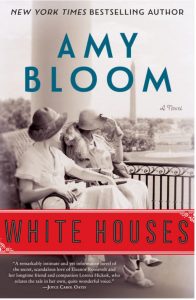Bloom ’75 Goes Behind Closed Doors in “White Houses”

Award-winning author Amy Bloom ’75, Shapiro-Silverberg Professor of Creative Writing, will release her latest novel, White Houses, on Feb. 13. The book centers on First Lady Eleanor Roosevelt’s love affair and friendship with reporter Lorena “Hick” Hickok. Told from Hickok’s point of view, White Houses covers everything from the inner workings of the Roosevelt administration to Hick’s own brutal upbringing in rural South Dakota.
Kirkus Reviews, in a starred review, says, “Bloom elevates this addition to the secret-lives-of-the-Roosevelts genre through elegant prose and by making Lorena Hickok a character engrossing enough to steal center stage from Eleanor Roosevelt.” While Publishers Weekly says, “Cleverly structured through reminiscences that slowly build in intimacy, Bloom’s passionate novel beautifully renders the hidden love of one of America’s most guarded first ladies.”

Bloom will embark on a book tour in support of White Houses later this month, starting at R.J. Julia in Madison, Conn., on Feb. 13. A full list of events, including several additional Connecticut appearances, can be found on Bloom’s website.
We caught up with Bloom to ask about her experience writing White Houses.
Is this your first time attempting such a novel, based on historical figures and events? Why this story, in particular? And what were the biggest challenges involved?
Every novel is, for me, an attempt to do something new. The Roosevelts were fascinating: great leaders, complicated people. The story of Eleanor Roosevelt and Lorena Hickok was a love story not just lost to history but literally torn out of the history pages. (Lorena was routinely cropped out of White House photos.) The greatest challenge was pretty much what it always is: Who are the people, how to the tell the story and who is telling the story. With the added burden that periodically a little voice would yell: These are real people!
How was this process different than creating characters sprung from your imagination (even if based on real people)?
The characters inevitably, even when based on fact and history, are products of my imagination, of empathy, of research and of a certain hard-to-describe leap.
How did you begin the process? Did you read the letters first and then decide to write a novel based on the relationship? Or were you always interested in exploring the genre?
I read Blanche Weisen Cook’s wonderful biography of Eleanor Roosevelt in which she mentions the 3,000 letters between Eleanor and Lorena and writes a bit about who Lorena was—crack reporter, first woman to have a byline in The New York Times, author—and about the love affair between them. Cook was pilloried for asserting that it seemed very likely there had been a love affair, until other historians finally read the letters and, slowly, too slowly, and privately, apologized and acknowledged that it was obvious from the letters that this had not been a schoolgirl crush on either side—between women in their 40s!—but a love affair that laid the foundation for a lifelong friendship.
How much did you know about the relationship, and about “Hick,” specifically, when you began writing? What additional research did you do, and how did that additional research inform your writing?
Research always offers one new rivers to follow, new gardens to visit. There have been tons of books about Eleanor Roosevelt and a few about Lorena Hickok in relation to Eleanor. I read an awful lot.
What did you find most interesting about (and what were the challenges involved in) inhabiting the mind of, and creating a voice for, Hick?
I struggled to find my narrator and there were parts of Hick I did not admire, but the Hick that I created from her letters and from her professional work is funny, frank, tough, clear-eyed, impulsive and a hell of a storyteller.
What about this story spoke to you—and what did you learn along the way that will stay with you?
Two things: A life of pretense is a death sentence, and love is not wasted, even when it ends.


